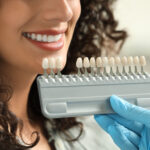When storytellers want to depict nervousness or intensity, one of the classic options is a person biting their nails. When many of us are stressed, anxious, or bored, we look for ways to alleviate those feelings. Some people turn to biting their nails. We know it, we’ve seen it, we might even do it. So, if it’s such a common reaction, then is it really something that needs to change?
In short, yes. Nail biting does not trim your nails properly and often goes too far, pulling much more of your nails and cuticles than intended. This can lead to deformities and infections on the fingers, and also digestive problems. Where the dentists at the Placerville Dental Group become concerned, however, is when the mouth and teeth are also affected. Think of all the surfaces your fingers touch through the day, and possible infections due to compromised fingernails and cuticles. It’s simply not a good idea to put those in your mouth. But nail biting also leads to wearing down the enamel and chipping teeth. It can eventually cause bruxism, an involuntary or habitual grinding of teeth. Fingernail “bitings” also may wedge their way into your gums, scraping and perhaps puncturing them, leaving your gums open to infection by whatever was on those bitings, or by bacteria already living in your mouth.
Breaking the Nail Biting Habit
However, nail biting is not an easy habit to break. So, what can you do?
- Invest in your nails. Take the time to clean and trim them; take pride in them. Have them professionally worked on by a pedicurist. You’ll be less likely to tear them apart if you’ve put time and money into them.
- Another money method is to ‘employ’ your family and friends. When they catch you doing it, you pay them an agreed amount. It’s amazing how observant children can become when money is involved.
- Try to avoid the situations that trigger nail biting. If it’s stress-induced, lower your stress levels. If you’re bored, find ways to alleviate the boredom. If convenient, wear a light set of gloves during those times you are usually prone to bite your nails.
- Apply a bitter-tasting liquid or nail polish to your nails. There are several products on the market to choose from, so take into consideration what will work best for your situation.
Many individuals have success by wearing a rubber band around their wrists. When they’re inclined to bite their nails, or catch themselves doing so, they snap the rubber band as a quick deterrent. Eventually, the snap is mentally associated with the biting. - Another method is to focus on one finger at a time. Don’t bite from that fingernail. Once you have it under control, work on the next one, and continue building your ‘no bite’ list until you have all ten fingers added.
The Placerville Dental Group does not want your visits with us to be a “nail-biting” experience. And if you enjoy those kinds of experiences, we merely encourage you to avoid the nail biting itself. If you have any concerns about the effects of nail biting or would like further information on how to avoid it, we’d be glad to discuss it with you at your next appointment.




0 Comments